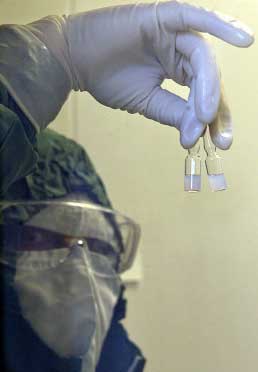 |
| An Omnivest laboratory staff member holding an H5N1 vaccine vial |
On March 14, Hungary announced the successful formulation of a vaccine against the H5N1 virus. Meanwhile, the avian influenza outbreak continues to spread rapidly.
This H5N1 vaccine, developed by the Hungarian pharmaceutical company Omnivest, is designed to provide immunity to humans against H5N1. Prime Minister Ferenc Gyurcsany stated that if the avian flu virus spreads in poultry farms, 20,000 individuals, including veterinarians, poultry farmers, and those who come into daily contact with birds, will receive vaccinations. The National Institute of Pharmacy and Nutrition of Hungary (OGYI) has given the green light for the production and mass distribution of this vaccine, and is ready to sell the vaccine formulation to other countries.
Meanwhile, the French pharmaceutical company Sanofi-Aventis, which is currently developing its own avian flu vaccine, claimed that the vaccine produced in Hungary “does not meet European standards” and thus is only valid within Hungary.
 |
| An Indian health worker disinfecting poultry farms in Maharashtra |
In another development on the same day, India reported the discovery of a new avian influenza outbreak, with four samples testing positive for H5N1 in four villages in Jalgaon, northern Maharashtra. These H5N1 virus cases are located approximately 140 km from the first outbreak site. Authorities have decided to cull over 75,000 birds in the area to prevent further spread.
In Afghanistan, officials confirmed that the H5 strain of the avian influenza virus is present in Kabul and the eastern province of Nangarhar. To date, five poultry samples have tested positive for the H5 strain, but the specific type of virus has yet to be determined.


















































